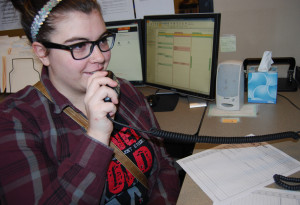The students behind the pick-up, drop-off bus service of the Center for Students with Disabilities.
Jan. 28, 2015
By Vesna Brajkovic
It’s almost 15 minutes to 11 a.m. and Kyle Crossett scoops up a ring of keys and a two-way radio and heads outside to one of the three vans marked “Warhawk Wheels” parked outside Andersen Library. The dispatchers voice radios-in to Crossett to announce one more pick-up. “Thanks Amy,” Crossett said before shifting the van into reverse.
A typical day at Adaptive Transportation, a fee-based pick-up and drop-off bus service through the Center for Student with Disabilities, involves dispatchers at the desk and drivers on-call to take students to and from their destinations; a service popular in the winter months.
Adaptive Transportation is the bus service for UW-Whitewater students with mobility or visual impairments that may prevent getting around campus safety. It is a sector of the Center for Student with Disabilities (CSD), which began in the Fall of 1971 in order to “maintain a high level of access” for students since there isn’t a campus transportation system, according to CSD director Elizabeth Watson.
Relationships and bonds are created between the drivers, dispatchers and the students who utilize the service, according to senior drivers Rebecca Horneck and Crossett.
“It’s not a work relationship, it’s more of a friendship,” Crossett said.
Jacob Cohen, Adaptive Transportation coordinator, said connection is an important part of the service.
“The bigger goal is building a sense of community between the riders and the drivers and people developing friendships and getting to know each other – people who might not have the opportunity to interact if they weren’t kind of thrown into this situation together,” Cohen said. “It’s been cool for me to see what a learning experience it’s been for the drivers and the sense of community I’ve been able to see develop.”
The Adaptive Transportation sector of CSD is made up of 21 student drivers and dispatchers.
“Adaptive Transportation employs anywhere from 20 to 30 students a year,” Watson said. “Which is actually really cool; it’s students employing students… if you think about it that way.”
Students are able to utilize the service not only for academic rides, which are given highest priority, but for non-academic rides as well. Non-academic rides, which include transportation services for evenings and the weekend, are given after 4 p.m.
They normally drive students to destinations in and immediately around the Whitewater area, but according to Watson, they will work with students to meet their academic needs that venture off-campus, like into Janesville, for example.

Vesna Brajkovic photo/ [email protected]
Dispatchers receive calls from the 25 students enrolled in the program, and they radio the drivers the pick-up locations.
“Easily the winter [is the busiest time of year],” Crossett said. “Especially when we’re changing over from regular rides to winter rides, that’s when all the riders who are not normally riders are putting their rides in. I think that’s the time that’s hardest for us because there’s a huge shift from the regular flow of people to double the amount.”
In the event of inclement weather where classes are cancelled, all academic and non-academic rides will be cancelled as well, but Crossett said when conditions aren’t deemed dangerous they’re on the job.
“We’re like the postal service: we keep going,” he said.
The fee of the service is worth it to some, especially in the harsh weather.
There are federal and state funding agencies and programs – like Aging and Disability Resource Centers’ program IRIS or the Division of Vocational Rehabilitation – that assist individuals with disabilities in gaining employment or independent living. Through these agencies, funding may be provided to help with the cost of a transportation service. Without third-party funding the service must be paid in full.
“The good thing is that we don’t try to make a profit,” Watson said. “We try to make enough money for the gas, the van and the drivers so we’ve averaged the cost out to be equivalent to what a freshman might be paying for parking, gas and insurance. When you look at our fee structure and you divide it out to 12 months, it’s pretty comparable to what a student driver would be paying for their fees.”
UW-Milwaukee has a free shuttle paid through student fees. If this idea was implemented in Whitewater to allow for free transportation to members of CSD, it could cause other issues, Watson said.
“Right now we go door-to-door and drop you off at your residence hall or building,” Watson said. “That might change to shuttle stops because you’re taking more students and you’re trying to schedule more. While it could be an interesting idea, you also have to look at what also might come out of it that could be more limiting because you would be designing a service to meet the general student population needs, while then also being accessible.”

